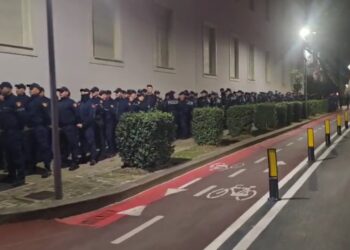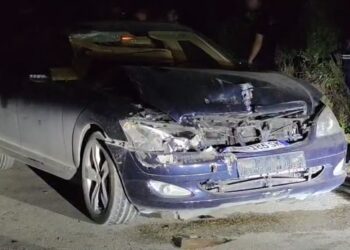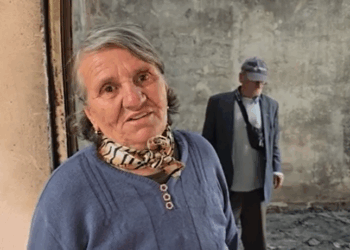The investigative network brings evidence of police links with drug trafficking: widespread corruption, failure to crack down on drug bosses ”
Albania is extinguishing an unprecedented amount of cannabis, but widespread corruption and the failure to crack down on multi-billion dollar bosses denies the argument of the “fight against drugs” of this NATO member state.
As the dusk leaves the night, the narrow path to the mountain becomes ever more difficult. Gjergj leads us ten minutes down the main road, through a beech forest where many lawns are planted with cannabis, which have already released the first spikes from the ground.
Twenty-one years old, Gjergji left university studies in order to take care of the plantation near an old house that his family has in the harsh Albanian Alps near the city of Shkodra in the north.
“This plant needs a lot of work. But if we get to the end, the profit will be considerable, “he says. “With the money I will win, I will fix the house in Shkodra. Then I’ll go to England. ”
Gjergji draws the bottles of water hidden in the bushes and fills them in rainwater pits in the forest to water cannabis plants.
“Now there are more young people like me here in the mountain dealing with cannabis than there is in the city,” he says. But success depends on an important factor.
“This is only valid if you have a police officer. He will inform me of the police operations in the area, so if I can harvest them, out of the 2,000 plants I have planted, 200 are his. ”
This means that tens of thousands of euros will end up in the pocket of a corrupt cop, if the plant grows strong and high.
These are the roots of a multimillionaire industry that has, over the last 25 years, turned Albania into one of the major cannabis sources in the international market, climbing alongside countries such as Colombia, Jamaica, the Netherlands and Paraguay.
In 2013, power changed hands and a new socialist government under the direction of a politician turned Edi Rama declared war on cannabis cultivation in the following year, with a five-day attack on an infamous drug center near the southern border of the country with Greece .
That year, 2014, police seized 101 tons of marijuana, just over the past nine years taken together. Over half a million cannabis plants were destroyed, and in the following year, this number increased to 800,000 roots, while in the first nine months of 2016, police say it has doubled the amount of plants destroyed again at 2.1 million roots.
Such figures, the Rama government argues, are evidence that it is gaining the fight against drugs after many years of impunity in the government of its Democratic opponents.
However, an investigation into the Balkan Exchange for Excellence Journalism introduces a more complex picture: unhindered, growers are spread in deep mountain areas; traffickers boast of protection they enjoy from the police; Italian investigators are astonished by the ability of Albanian criminal groups; and in Europe and the United States, governments complain about the apparent failure of their ally in NATO to arrest a higher trafficker than ordinary soldiers.
Widespread poverty, in turn, weakens the effort to convince marijuana growers that they have an alternative.
“Criminal organizations are such that they learn and adapt quickly against the punishments from above, down,” says Jana Arsovska, a professor at John Gray’s Criminal Justice College in New York and an expert on organized crime in the Balkans.
“You need people and society to fight this problem, not just state agencies.”
Selective justice
The war began in Lazarat, a village in southern Albania, in which, over the last 15 years, a unique cannabis industry was built throughout Europe. Severely armed, the village responsible for nearly half the cannabis production in Albania with a production of about 900 tons a year, amounting to 4.5 billion euros with the value of the road in Europe.
Its residents, who openly cultivated cannabis in the courtyards and in the fields, voted regularly for the Democrats who ruled the country from 2005 to 2013.
Rama ordered the destruction of the cannabis industry of this village one year after taking the post of prime minister and only a few days before the European Union decided whether to give Albania the status of candidate country, what will bring the country more funds EU.
About 800 police officers, including special forces with armored vehicles, surrounded the village in June for five consecutive days, facing the shooting of those who were determined to defend the crops before retreating and hiding in the mountains . About 130,000 cannabis plants were burned, four drug labs were destroyed, and 80 tons of marijuana were confiscated. Tens of people were arrested.
Rama said the police had broken “the 20-year taboo of a crime scene that had declared itself an independent republic and had become a shame for Albania.”
His interior minister, Sajmir Tahiri, said it demonstrated the government’s determination to “rule the rule of law in every corner of Albania”.
But two years later, only 10 people were jailed, mostly accused of firing firearms and marijuana cultivation.
The arrestees were widely seen as small players in an organized-scale industrial crime operation, while group leaders seemed to have left intact or likely not to be there at all.
But two years later, only 10 people were jailed, mostly accused of firing firearms and marijuana cultivation.
The arrestees were widely seen as small players in an organized-scale industrial crime operation, while group leaders seemed to have left intact or likely not to be there at all.
In the Progress Report on Albania’s Membership Application, published in November 2016, the EU praised “impressive drug seizures and destruction of cannabis plantations,” but said the number of convictions continues to be low. Investigations and persecutions, the report says, “do not go up enough in the supply chain.
“The police and the prosecution fail to identify criminal groups after drug cultivation and drug trafficking while efficient legal prosecution in criminal proceedings is rarely safe,” the report said.
The previous year’s report warned that financial investigations, anti-money laundering measures, and asset confiscation were “under-utilized”.
Indeed, between 2010 and 2015, the report says, less than 35 people have been sentenced for money laundering.
Arsovska told BIRN: “Albanian society works with the system of close relatives and friends and someone can be arrested only when he has no friends in the police or public administration.”
“Although the government claims it is ‘fighting’ the drug problem, at the same time we have significant perpetrators of drug traffickers who are released and escorted to prison.”
US Ambassador to Tirana Donald Lu highlighted this problem in September when he told a group of journalism students how the current and past government “have a problem with drug trafficking and that politicians have benefited from their links with drug trafficking “.
He reminded the listeners: “We know that there are many members of parliament, there are mayors in Albania and there have been mayoral candidates who have drug trafficking punishments in EU member states.”
BIRN asked for an interview with the Interior Ministry and sent emails on corruption issues between police officers and allegations that the state failed to crack down on the cannabis industry but did not get the answer. BIRN also requested a comment from the State Police and the border police but did not receive an answer again.
Adjusting to survive
There are signs that shattering in Lazarat has distributed growers to other areas in order to meet demand; they are increasingly sowing in public lands and not in private lands, within forests or on mountain slopes in remote areas, making it difficult for the police to distinguish plantations and identify those responsible, police say.
In an internal analysis from the office of the General Prosecutor of Albania, part of which came to the Albanian media in June, writes: “Over the last months, cannabis cultivation has spread throughout the country and in all circles.”
“Cannabis sativa growers,” according to a portion of the report provided by BIRN, “use land under public ownership, mostly in forests and pastures, or near water sources that are far from residential areas.”
A spokesman for Attorney General Adriatik Llalla, who was appointed to the post of parliament under the previous government led by the Democrats in 2012, did not respond to BIRN’s requests to confirm the existence of the report and its findings.
“The situation this year is incomparable with the past years, due to the huge growth of cultivated area,” said Hivzi Bushati, former Special Police Directorate for Northern Albania, who was dismissed when the Socialists took over power and is now a member of opposition Democrats.
“Regardless of police and politics, no one has the courage and courage to invest such as to cultivate thousands of cannabis plants across the country,” he told BIRN at a cafe in Shkodra.
The government rejects the argument that cannabis production has increased or that police officers are involved in it. It also dismisses the allegations raised by Democrats in opposition to cooperation with traffickers.
“The public is creating the wrong impression that there is an increase in cultivated cannabis surface,” said Altin Qato, deputy general director of State Police at a press conference in August. “In fact this is not the case, the police are simply better able to identify and act.”
He said the Interior Ministry has no data implicating police officers.
“If we did, we would have to arrest them because the associates are the same as the growers.”
Later, in September, Qato said eight police officers were dismissed while 21 others were under investigation on suspicion of not monitoring the areas under their responsibility
Fertile soil
Blessed with 218 sunny days a year and with abundant water resources flowing from the mountains, Albania is a fertile ground for cannabis.
Enver Hoxha, the communist dictator who closed Albania’s borders during his Stalinist and paranoid rule after World War II, stopped cannabis cultivation in 1946. This drug was freely traded for amusement and use as a child remedy for children.
Under the regime of Hoxha, the state took control, increasing it as an industrial plant for export, on the grounds of what is today the Agricultural University in Kamza, a municipality in the district of Tirana.
“It’s a very good quality cannabis,” BIRN Ahmet Osja, the last Agriculture Minister for the ruling party, told before communism collapsed in 1991-92.
“The Swiss were looking for it because it was good quality and because it was easy. Used in pharmaceuticals, medical plants and rope. ”
The end of communism brought a decade of violent instability with civil rebellion in Albania and war in the neighboring countries of former Yugoslavia.
Weapons became common, politics became too polarized, and criminal groups flourished.
A NATO member country since 2009, Albania is still facing the legacy of the 1990s and the power of organized and deeply rooted criminal networks, which have spread throughout Western Europe.
Arsovska said the short-lived efforts of successive governments in Albania since the collapse of communism to stop drug trafficking became “more about fame and adverts”, often motivated by the “stick and carrot” policy followed by the EU to countries of the Balkans who dream of joining one day in this block.
“In general, there is a lack of solid and long-term institutional organization in the fight against organized crime in Albania,” she said. “Organized crime lives in symbiosis with state institutions.”
“Flexible adaptation based on roadside analysis to overcome government anti-drug policies helps explain why illegal industries continue to exist in Colombia or in Albania, despite the fact that governments have destroyed several key organizations, including Medellin and Kali [Colombian drug cartels] or the group of Lazarat. ”
The United States Intelligence Agency (CIA)’s World Fact Sheet World Book describes “limited opium production and cannabis production in Albania” and says that Albanian narcotics organizations are “active and expanding in Europe “.
The carrier
In Hot, a mountainous mountain village bordering Albania and Montenegro, a trafficker showed a narrow trail hidden between shrubs and trees.
“From this point on, we use pet for transportation,” he said.
“Police work is simple, as soon as an agreement is reached. They just turn the radar to the other side, far from the mountain and towards the Lake of Shkodra, and tell us when it’s the free way to send safe merchandise to the destination. ”
“To transport one kilogram of cannabis sativa, we pay 50 euros and this covers carriers in Albania and Montenegro, while police take another share because it is impossible to transport anything without their permission,” he told BIRN . Carriers use gums, he said, loaded with 50 to 100 kilograms.
“Usually only those who try to pass themselves or are not correct with payments with their contacts within the border police are arrested,” the trafficker explained.
In Hot, such a ‘conveyor’ occupies a chair at the corner of a coffee on the terrace facing the street. He says he has the name Gezim.
“Everyone here has ears, though they all do this,” he says.
Like other carriers, he knows the terrain and has links to the police.
“If you do, you should talk to those in power. Otherwise, he ends up in prison for a very long time. ”
According to Albanian law, cultivating and transporting cannabis is punishable by three to seven years in prison, and if done as part of an organized group, it is sentenced to five to ten years in prison. Leaders of criminal groups may be sentenced to seven to 15 years in prison.
From Hoti to Montenegro, the drug finds its way further through the porous borders of the former Yugoslav republics, through Serbia, Bosnia or Croatia, and finally, in the Schengen area of the European Union, which begins in Hungary or Slovenia.
Other traffickers follow a more direct route, from the sea or air from the western coast of Albania to the Puljan shores of southern Italy. Less than 200 kilometers is the distance that divides Durres into Albania with the port of Bari in Italy.
“The Albanian Marijuana often comes with strong snipe, through land from Montenegro, Croatia and Slovenia, or small jets called Piper,” said an investigator at Guardia di Finanza, the Italian agency tasked with fighting financial crime, traffic and drug trading.
“According to the latest method, traffickers simply throw huge amounts of drugs in Puglia, where their affiliates on the ground are waiting,” said the investigator, who spoke in anonymity because he was not authorized to speak to journalists at an interview with BIRN in Bari.
Piper’s preferred trawlers are lightweight, with one engine and two seats and can hold up to 500 pounds. They fly up to 1,600 kilometers with a refueling.
A 2015 report from Italy’s Central Drugs Directorate reports the use of smugglers of “clandestine tracts built across the Adriatic”.
Italy’s National Anti-Mafia Directorate also in a 2015 report said one of the favorite tactics of traffickers was to hide drugs among other goods in “barges, vans, or modified cars” passing through Bari’s harbor.
According to Guardia di Finanza figures, in 2014, 3 tonnes of cannabis were caught in this port. That figure dropped to 1.8 tons in 2015, but only within a single day in July 2016, a 10-meter long slope was detained and was found to be carrying 1.2 tons of cannabis with a final value of 12 million euros.
In 2006, under the leadership of Prime Minister Sali Berisha, Albania imposed a moratorium on private riders to fight trafficking in human beings and drugs, while the government tried to persuade the European Union to liberalize visas for Albanians.
The moratorium expired in 2013, shortly before the election Berisha lost to Rama and has not been renovated anymore.
Because there are no oversight capacities, Albania signed an agreement with Italy in August 2012 for the Italian police to monitor cannabis-cultivated areas. Photos are sent to the University of Naples, where experts count the number of cannabis plants.
In 2014, survey flights identified 815 plantations carrying about 165,000 roots.
Patrols covered a territory of about 15 percent of Albania’s territory, according to Guardia di Finanza figures. In 2015, it identified 1,200 plantations with about 243,000 roots, as it covered again 15 percent of the territory.
“We need money”
“When the police destroy more plants, they (growers) simply increase the sown area,” said Artan Hoxha, a journalist of black chronicle.
Hoxha has been reporting on drug and crime in Albania for many years and in 2015 received death threats via SMS from a phone number registered in the Netherlands.
“This year … to make it harder for the police to attack, they (the traffickers) have increased the number of plantations and distributed the plant all over the country,” he told BIRN, “making it impossible for the police to destroy them all. ”
“Albanian police do not have enough people or equipment to operate across the country. Those caught are mostly unorganized individuals or poor peasants, while most plantations survive. ”
The EU’s Progress Report for 2015 said the level of equipment and police logistics was worrying. The report says police use “very little” the strategic intelligence available to it under an operational agreement with Europol, the EU’s law enforcement agency.
“The low capacities of the judicial police and the prosecution to identify and investigate complex criminal cases mean that they are limited to simple investigations that end up with flagrant arrests, hence there is no comprehensive approach for investigators and prosecutors.”
State Police in Albania has about 10,000 officers for a population of about 2.7 million, with an average salary of about 350 euros a month. The average salary in Albania is only slightly higher, around 370 euros a month. Almost one in every five working age people is unemployed and agriculture is the sector with the largest number of employees.
Traffickers have little trouble finding co-workers willing to raise cannabis or police officers ready to close one eye.
Arsovska told BIRN: “Criminal-political proximity fueled by corruption enables organized crime to flourish.”
Bribery, she said, has a “long tradition” and is generally acceptable.
“If we look at the situation in Afghanistan,” Arsovska said, “it is difficult to tell farmers to stop sowing opium unless you have a better alternative to offer them. The alternative should be just as profitable and less risky so that the bid decreases. It is difficult to tell people to stop co-operating with law offenders if they do not have the best way to make money, or whether they simply are not afraid of punishment. ”
Gjergji, in the mountains above Shkodra, summarized in a few words.
“[Buyers] have money, we have the craving. That’s simple, “he said. “A pound of cannabis can be sold for 800 or 1 thousand euros. So you realize how important it is. ”
“We want to live and we need money. Not everyone will be saved, but I hope for myself that I will be saved. “/ Elvis Nabolli – BIRN















